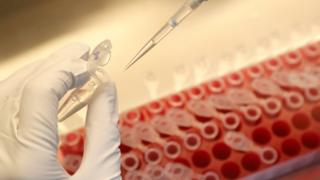This website uses cookies so that we can provide you with the best user experience possible. Cookie information is stored in your browser and performs functions such as recognising you when you return to our website and helping our team to understand which sections of the website you find most interesting and useful.
 Image copyright Reuters
Image copyright ReutersA group of nine vaccine developers has announced a "historic pledge" to uphold scientific and ethical standards in the search for a coronavirus vaccine.
The firms, including Pfizer and Merck, said they would only apply for regulatory approval after vaccines went through three phases of clinical study.
It comes amid global debates about the safety of vaccines made this year.
US President Donald Trump has said he wants one available in the US before November's election.
No vaccine has yet completed clinical trials, according to the World Health Organization (WHO) - leading some scientists to fear the search for a vaccine is being politicised, and public trust could be damaged.
In their pledge, the nine biopharmaceutical firms did not mention Mr Trump but said they believed their action would "ensure public confidence" in the development of any inoculation.
They pledged to "always make the safety and well-being of vaccinated individuals our top priority".
Other signatories were industry giants Johnson & Johnson, BioNTech, GlaxoSmithKline, AstraZeneca, Moderna and Novavax.
"Together, these nine companies have collectively developed more than 70 novel vaccines that have helped to eradicate some of the world's most complex and deadly public health threats," the statement added.
Nearly 180 vaccine candidates are being tested around the world, the WHO says.
The organisation has said it does not expect a vaccine to meet its efficacy and safety guidelines in order to be approved this year because of the time it takes to test them safely.
None of the candidate vaccines in advanced clinical trials so far has demonstrated a "clear signal" of efficacy at the level of at least 50% sought by the WHO, spokeswoman Margaret Harris said last week.
"In terms of realistic timelines, we are really not expecting to see widespread vaccination until the middle of next year," she added.
Despite this, China and Russia have begun inoculating some key workers with domestically developed vaccines - all of them are still listed by the WHO as being in clinical trials.
Meanwhile, the US national regulator, the Food and Drug Administration (FDA), has suggested that coronavirus vaccines may be approved before completing a third phase of clinical trials. This phase can often involve thousands of participants and can last several years.
- Short cuts and 'dirty tricks' in the scramble for a vaccine
- How will the world vaccinate seven billion people?
Last week it also emerged that the US Centers for Disease Control and Prevention had urged states to consider "waiving requirements" in order to be able to distribute a vaccine by 1 November - two days before the 3 November presidential election.
President Trump has hinted that a vaccine might be available before the election. But his Democratic rival Joe Biden has expressed scepticism that Mr Trump will listen to scientists and implement a transparent process.



 Africana55 Radio
Africana55 Radio 
